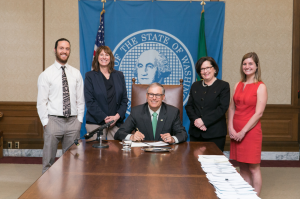Dear Friends and Family,
Friday was the last day of regular session and we are now on our way into special session. Unlike other states that have full-time state legislatures, members of the Washington State Senate and House of Representatives work on a part-time basis. Many of us juggle legislative work with our respective professions which means that the amount of days we are actually in Olympia, passing bills and working on the budget, is rather limited.
So what is special session? Within the two-year legislative cycle (biennium), two kinds of legislative sessions exist – regular sessions and special sessions. Regular sessions are mandated by the State Constitution and begin the second Monday in January each year. In odd-numbered years, like this year, the regular session is 105 days. In even number years, it is 60 days. Special sessions are called by the Governor to address specific issues, like the budget. There can be any number of special sessions within the two-year cycle, but they cannot last more than 30 days at a time.
This year, Governor Inslee has called for a special session because the Senate and House could not come to agreement on the operating, transportation, and capital budgets within the 105-day time-frame. Budget leaders and members of leadership will be working hard towards a compromise on what will be included in all three budgets. We have a tremendous amount of work ahead of us because we must ensure our state gets back on track and our much needed services are funded.
The biggest challenge facing us is negotiating with the Senate. They refuse to consider our proposals and will not even come to the table to discuss a budget that reflects the needs of all Washingtonians. Instead, the Senate stands firmly behind a budget that cuts tens of millions out of the State Need Grant to help deserving kids go to college, raids the marijuana prevention and education funding set up by I-502, and passes a major property tax increase. These revenue sources have unforeseeable consequences that will ultimately shortchange critical investments in our state’s children, workers, and families. My colleagues and I in the House are committed to reaching a compromise that does not sacrifice what Washingtonians need and value – high-quality education, good jobs, economic opportunities, and a clean environment. We need to stop cutting key investments and it is time to get our state on the road to progress.
We must fund a budget that is responsible and meets both our constitutional and moral obligations. A budget is a values statement about who we are and what we believe in. If we simply cut, cut, cut and leave those with the most need behind, we are failing. But if we choose to move forward together and make investments in our future, we will have a stronger, healthier, and happier Washington for everyone.
The Levy Issue
Over the past weeks, Representatives Sullivan, Hunter, Carlyle, and I have been working on legislation that resolves the second half of the McCleary decision – the unconstitutional over-reliance on local levies to fund education. You may recall that four years ago Representative Hunter proposed the concept of the “levy swap.” Under this model, the Legislature would attempt to address our dependence on local levies for school funding by increasing the state property-tax levy for schools while reducing local school levies by the same amount. The plan has stirred a lot of discussion. Mixed reviews over the years in conjunction with uncertainty regarding the proposal’s implications have ultimately undermined the implementation of the levy swap proposal.
My colleagues and I therefore took a new approach to ameliorating local levy dependence. We created a framework outlining a two-year process for resolving the issue. Although not as detailed as other recently introduced proposals, our legislation compels us to discuss education funding issues in public rather than behind closed doors. It also sets forth the details of every decision that must be made and a required timeline for making them. I encourage you to read Representative Hunter’s blog to better understand the specifics of the legislation.
Bill Signing
I am pleased to report that HB 1179 was signed into law by Governor Inslee on Friday. This bill exempts cider makers from the wine commission assessment. The rapid growth and strong market potential of the Washington cider industry require marketing efforts that are focused on cider products as a unique beverage category. The bill allows cider makers to support their own marketing efforts, which will benefit the cider industry by exempting them from an assessment that primarily supports wine. It passed out of the House and Senate unanimously.

As we move through this special session, please don’t hesitate to call (360.786.7800) or email (kristine.lytton@leg.wa.gov) with any questions, comments, or thoughts you may have.
All the Best,
Kristine

